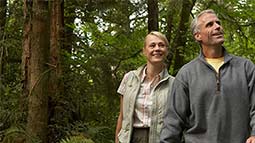Thinking about an ecotourism destination for your next trip? Even if a tour operator promises you'll get close to nature, that doesn't mean your trip is truly eco-friendly. Here's what you need to know about ecotourism.
What is ecotourism?
People often think ecotourism means going to a beautiful nature preserve and communing with critters. Not exactly. Nature tourism is visiting a place to enjoy its natural beauty and wildlife. True eco-tourism is something more. It means traveling in ways that help conserve the environment and improve the well-being of local people, according to the International Ecotourism Society.
Popular ecotourism destinations
For many, the first ecotourism destination that comes to mind is Costa Rica. This small Central American country was one of the first to develop eco-friendly ways for visitors to experience its natural beauty. See poison dart frogs in the Monteverde Cloud Forest, toucans at La Selva Biological Station and sea turtles at Tortuguero National Park.
The Galapagos Islands off the coast of Ecuador, where visitors can see animals and birds that exist nowhere else in the world, were once threatened by too-heavy ecotourism. Now, strict guidelines ensure that eco tours minimize impact on the islands' delicate ecosystem.
Kenya's 54 national parks and reserves offer amazing opportunities to see elephants, rhinos, lions and leopards. While standard safari tours have been offered for decades, eco tours that support wildlife conservation are rising in popularity.
Planning your ecotourism vacation
What is ecotourism about? Not just traveling responsibly, but also seeking out memorable experiences. Why would you choose a room at a mega-resort when you could stay in a beachside bungalow, a log cabin, or even a yurt?
Ecotourism doesn't necessarily mean roughing it. While some green destinations offer rustic accommodations, other eco-resorts specialize in green luxury. Think solar panels, low-flow bathroom fixtures and architecture that's sensitive to its surroundings.
An ecotourism vacation can be as inexpensive - or as expensive - as you'd like. A night in a treehouse at theRosalie Forest Eco Lodge in Dominica is just $70. A villa on North Island in the Seychelles, a luxury resort that works to restore the island's natural ecosystem, costs up to $5,000 per person per night. Want to browse the options? National Geographic compiled a collection of 50 beautiful eco-lodges around the world.
To determine if a destination truly qualifies as ecotourism, ask your tour or hotel operator these questions: how are wastewater and trash handled, is recycling available, does the resort hire local people, and what does the hotel do to help preserve the surrounding environment?
Don't forget that your own travel decisions matter. Take public transportation instead of renting a car. Don't feed or disturb local wildlife. And remember the old adage: Take only photographs, leave only footprints.








Share this Page